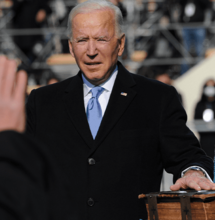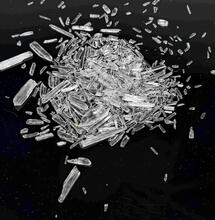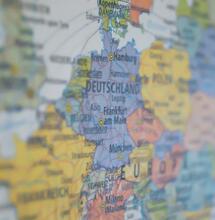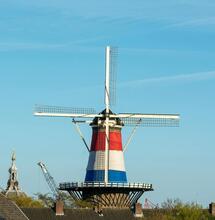Pro-Pot Presidents

Most folks know about modern presidential relationships with Cannabis, but the association at this high level dates back to our very first one.
Most folks know about modern presidential relationships with Cannabis, but the association at this high level dates back to our very first one.
While it is true that recent commanders-in-chief Bill Clinton, George W. Bush and Barack Obama have publicly admitted to having used Cannabis at one point, past presidents were even more enthusiastic about the plant. The main difference, however, between then and now is that our earliest leaders were present when there was no distinction between hemp and marijuana. In honor of our nation's impending birthday, here is a list of pot-friendly presidents.
|
George Washington, circa 1790 [Credit: Library of Congress, ppmsca.19171] |
George Washington: Our first president is perhaps the most famous to have appreciated the value of hemp with regards to both agriculture and recreation. Washington viewed hemp cultivation as extremely important to the nation, leading to hemp being used as currency. His anecdotes are nearly too numerous to mention; here are just a few.
"President George Washington wrote a letter that contained an oblique reference to what may have been hashish. 'The artificial preparation of hemp, from Silesia, is really a curiosity.' Washington made specific written references to Indian hemp, or Cannabis indica.... His August 7, 1765 diary entry, 'began to separate the male from the female (hemp) plants,' describes a harvesting technique favored to enhance the potency of smoking Cannabis, among other reasons." [Hemp: Lifeline to the Future (Chapter 16, A World of Cannabis Cultures) by Chris Conrad]
"George Washington allegedly preferred to smoke 'the leaves of hemp' rather than to drink alcohol. While campaigning with the Army of the Revolution, General Washington was heard to bemoan that he could not be at home to harvest his hemp crop." [The Great Book of Hemp: The Complete Guide to the Environmental, Commercial, and Medicinal Uses of the World's Most Extraordinary Plant, by Rowan Robinson, p. 135]
In Washington's 1796 letter to William Pearce, his overseer, he queried: "What was done with the Seed saved from the India Hemp last summer? It ought, all of it, to have been sown again; that not only a stock of seed sufficient for my own purposes might have been raised, but to have disseminated the seed to others; as it is more valuable than the common Hemp." [Robinson, p. 131]
Thomas Jefferson: Hemp farmer, visionary and third president Thomas Jefferson drafted the Declaration of Independence on what was likely hemp (rag) paper. Jefferson also revolutionized hemp processing by modifying a thresher to more efficiently break the plant's tough stalks. There is a great chance that he smoked, judging by notes in correspondence, his proclivity for hemp cultivation and his well-known distaste for alcohol and tobacco. It has been said that Jefferson and his friend and fellow hemp grower, George Washington, traded special smoking blends as gifts.
"Hemp farmer Thomas Jefferson and paper maker Ben Franklin were ambassadors to France during the initial surge of the hashish vogue. Their celebrity status and progressive revolutionary image afforded them ample opportunities to try new experiences. Jefferson smuggled Chinese hemp seeds to America and is credited with the phrase in the Declaration of Independence, 'Life, liberty and the pursuit of happiness.'" [Conrad, Chapter 16]
James Madison: The 'Father of the Constitution' and fourth American president claimed that hemp gave him insight to create a different, modern country. "James Madison was once heard to say that smoking hemp inspired him to found a new nation on democratic principles." [Robinson, p. 135]
James Monroe: The fifth president of this country was introduced to hashish when he was an ambassador to France. He continued smoking until his death at the age of seventy-three, according to [Robinson, p. 135]
|
A portrait of John Quincy Adams from 1843 |
John Quincy Adams: Our nation's sixth president, Adams had lived in Russian as a young man, leading him to pen an 1810 report titled On the Culture and Preparing of Hemp in Russia. This explained the arduous, time-consuming process of cultivating, water-retting, breaking and hackling hemp in Russia, which was performed during that era by inexpensive serf labor. The process could take up to two years from sowing to completion and delivery to port. At this time in history, Russian hemp was vastly superior to American hemp, which was typically dew-retted during that period. It is likely that Adams had sampled his crops from time to time. [Robinson, p. 134]
Andrew Jackson: In personal correspondence, it is noted that Andrew Jackson, seventh American president, smoked Cannabis and tobacco cigars with his troops during wartime.
Zachary Taylor: Another military man-turned-president, Zachary Taylor, our nation's twelfth leader, was also known to have smoked hemp with his troops.
Franklin Pierce: The fourteenth president of the United States, Franklin Pierce was another military man who ended up leading the country. He is widely reported to have smoked hemp with the troops as general during the Mexican-American War. According to noted hemp author Chris Conrad, "Cannabis was twice as popular among American soldiers in the Mexican War as in Vietnam: Pierce wrote to his family that it was 'about the only good thing' about that war."
Abraham Lincoln: America's sixteenth president is commonly cited as being hemp-friendly - and he likely was, but it cannot be proven - although two of his most famous quotes have been debunked. Perhaps the most noted is: "Prohibition... goes beyond the bounds of reason in that it attempts to control a man's appetite by legislation and in making crime out of things that are not crimes. A prohibitory law strikes a blow at the very principles on which our government was founded." Unfortunately, this quote has been attributed instead to an Anti-Prohibition campaign manager in a local option race, who penned the phrase in 1887 during a fierce debate between those both in support of and against alcohol Prohibition. In an attempt to secure the African American vote among the 'wets' or pro-alcohol crowd, campaign manager Colonel John B. Goodman wrote and distributed the fake Lincoln quote.
Although some insist that Mr. Lincoln favored "a pipe of sweet hemp, and playing my Hohner harmonica," according to a letter dated 1855 and purported to be held by the Hohner museum, it has been noted that such musical instruments were not in fact exported from Germany to the United States until two years later, in 1857. There is also no record of such letter at the museum and Lincoln would not yet have been president during the supposed letter writing, although there remains a slim chance that he would be in possession of such an instrument at the time.
From our seventeenth president, Andrew Johnson, to the thirty-fourth, Dwight D. Eisenhower, very little record of presidential pot use remains. Many records were destroyed during this period, including personal correspondence that could have revealed much about the habits of our leaders. It is known, however, that pre-Civil War America was a land rife with hemp, leading to the public use of over-the-counter patent Cannabis medicines, so it is likely that presidential connections to the drug do exist. After the Civil War, anti-Mexican sentiment and graphic propaganda campaigns lessened public approval of the use of the plant, beginning the era of secrecy and clandestine Cannabis consumption.
John F. Kennedy: Our thirty-fifth president may have smoked Cannabis to relieve back pain, a theory that has anecdotal proof in several forms. One such mention is listed in John F. Kennedy: A Biography, in which a July evening in 1962 is described. According to James Truitt, eventual vice president at the Washington Post, Kennedy smoked pot with Mary Meyer (with whom JFK was also said to be having an affair). "The president smoked three of the six joints Mary brought to him," the book states. "At first he felt no effects. Then he closed his eyes and refused a fourth joint. 'Suppose the Russians did something now,' he said."
Jimmy Carter: Since the Nixon-era inception of the War on Drugs, our thirty-ninth president, Jimmy Carter, has been the most vocal and progressive commander-in-chief with regards to Cannabis. While he may or may not have smoked it himself, his son famously toked with Willie Nelson on the roof of the White House. Carter pressed for legalization during his tenancy, informing Congress that he supported "legislation amending federal law to eliminate all federal criminal penalties for the possession of up to one ounce of marijuana."
William J. Clinton: The forty-second leader of the United States is slightly infamous for in-office indiscretions. His fellow Oxford attendee, the late Christopher Hitchens, noted Mr. Clinton's preference for space brownies rather than smoking. Clinton's most famous response to the weed question was, "When I was in England, I experimented with marijuana a time or two, and I didn't like it. I didn't inhale and never tried it again."
|
President Barack Obama has stated that he did inhale, as “that was the point” [Credit: Pete Souza] |
George W. Bush: Mr. Bush, forty-third American president, has been relatively honest about his past cocaine use but always remained cagey when questioned about pot. He is said to have later explained himself to his biographer, "I wouldn't answer the marijuana questions. You know why? Because I don't want some little kid doing what I tried."
Barack Obama: Our forty-forth and current president has spoken candidly about his experimental drug use when a young man in Hawaii, including Cannabis and cocaine. Perhaps his most famous statement regarding pot was when he stated, during his 2008 campaign, "When I was a kid, I inhaled, frequently. That was the point."
[Header photo of hemp field courtesy of WikiMedia Commons user Aleks]



